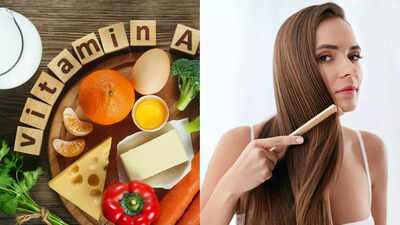ARTICLE AD BOX

Vitamin A is a vital nutrient that supports the health of your skin, hair, and eyes. It plays a key role in the growth and repair of body tissues, particularly the scalp and hair follicles.
Adequate levels of vitamin A help maintain moisture balance in the scalp, encourage cell renewal, and promote healthy hair growth. However, both too little and too much of this vitamin can cause problems such as dryness, breakage, or even hair loss. Maintaining the right balance through diet or supplements is therefore essential. Understanding how vitamin A functions in the body enables you to utilise it effectively to maintain strong, shiny, and naturally nourished hair.
Understanding the forms of Vitamin A and how they support hair growth
Vitamin A is a fat-soluble vitamin that exists in two main forms:
- Preformed Vitamin A (retinol): Found in animal-based foods such as eggs, liver, and dairy products.
- Provitamin A carotenoids (like beta-carotene): Found in colourful fruits and vegetables such as carrots, sweet potatoes, and spinach.
The body converts beta-carotene into retinol, which is then utilised for various biological functions, including maintaining healthy skin, vision, and promoting hair growth. According to a study published in the journal Nutrition, the body efficiently converts beta-carotene from plant foods into vitamin A, helping maintain healthy hair and skin when consumed regularly.
The role of Vitamin A in hair health
Vitamin A supports the growth and maintenance of healthy hair in several ways:
- Promotes sebum production
Vitamin A helps the skin glands produce sebum, a natural oil that moisturises the scalp and keeps hair soft and shiny. Without enough sebum, the scalp can become dry and flaky, leading to brittle hair and dandruff.
- Supports hair follicle growth
Retinoic acid, a derivative of vitamin A, influences the activity of hair follicle stem cells. Adequate levels of vitamin A help these cells divide and grow, promoting new hair growth and reducing hair thinning.Vitamin A helps cells grow and repair efficiently. A healthy rate of cell turnover ensures that hair follicles remain active and strong, which contributes to overall hair density.
The scalp is an extension of the skin, and vitamin A plays a key role in maintaining the epithelial tissues that line it. A healthy scalp provides the best environment for hair growth.
Vitamin A Deficiency causes hair loss
A lack of vitamin A can lead to a condition called follicular hyperkeratosis, where hair follicles become plugged with keratin.
This can result in rough skin and hair loss. People with low vitamin A levels may also experience dry hair, an itchy scalp, and slow hair growth. In severe cases, deficiency can cause thinning hair or patchy baldness. However, these symptoms can often be reversed with adequate vitamin A intake from diet or supplements, under proper medical guidance.While vitamin A is necessary for hair health, excess intake can be harmful.
High doses from supplements or retinoid-based medications may lead to hair loss, dryness, and reduced oil production in the scalp. This is because vitamin A affects the hair follicle cycle. When levels are too high, it can disrupt normal cell function and trigger premature shedding of hair.
Best food sources of Vitamin A for healthy hair
The easiest way to maintain healthy vitamin A levels is through a balanced diet. Here are some excellent food sources:
- Animal sources: Liver, eggs, fish oils, cheese, and milk.
- Plant sources: Carrots, pumpkin, sweet potatoes, spinach, kale, and apricots.
- Fortified foods: Some breakfast cereals and dairy products are enriched with vitamin A.
Eating a variety of these foods ensures you get enough vitamin A naturally without the risk of overconsumption.
Vitamin A supplements for hair growth
If your diet does not provide enough vitamin A, supplements can be helpful. However, they must be used carefully. The recommended daily intake for adults in the UK is 700 micrograms for men and 600 micrograms for women, according to the Scientific Advisory Committee on Nutrition.Taking too much can lead to toxicity, causing symptoms such as nausea, dizziness, and hair loss. Always consult a healthcare professional before starting supplements.
Topical use of Vitamin A for hair
Apart from dietary intake, vitamin A derivatives (retinoids) are sometimes used in topical hair treatments.
These can help rejuvenate the scalp and promote hair growth by boosting cell renewal and improving scalp texture.However, topical retinoids can be potent and may cause irritation or dryness if used improperly. They are often combined with other nourishing ingredients like vitamin E or oils to balance their effects.
Combining Vitamin A with other nutrients
Vitamin A works best when paired with other nutrients essential for hair growth:
- Vitamin E protects hair from oxidative stress.
- Vitamin D helps stimulate hair follicles.
- Zinc and iron support scalp health and prevent hair thinning.
- Eating a diet rich in these nutrients enhances the overall effectiveness of vitamin A.
Safety tips for using Vitamin A for hair
- Always get your vitamin A mainly from food sources.
- Avoid taking high-dose supplements without medical advice.
- Combine vitamin A-rich foods with healthy fats (like olive oil or nuts) to improve absorption.
- If using topical products, do a patch test first to prevent irritation.
- Consult a doctor if you notice hair loss or scalp issues that persist despite good nutrition.
Disclaimer: This article is for informational purposes only and should not be considered medical advice. Please consult a healthcare professional before making any changes to your diet, medication, or lifestyle.Also read | How to get rid of oily and sticky dandruff: 10 tips for a healthy scalp

 8 hours ago
6
8 hours ago
6









 English (US) ·
English (US) ·